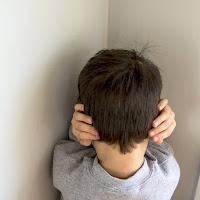- a racing heart
- fatigue
- frequent trips to the toilet
- nausea
- shaking
- stomachaches
Possible triggers for school phobia include:
- Being bullied
- Being off school for a long time through illness or because of a holiday
- Being unpopular, being chosen last for teams and feeling a physical failure (in games and gymnastics)
- Bereavement (of a person or pet)
- Fearing panic attacks when traveling to school or while in school
- Feeling an academic failure
- Feeling threatened by the arrival of a new baby
- Having a traumatic experience such as being abused, being raped, having witnessed a tragic event
- Moving to a new area and having to start at a new school and make new friends or just changing schools
- Not having good friends (or any friends at all)
- Problems at home such as a member of the family being very ill
- Problems at home such as marital rows, separation and divorce
- Starting school for the first time
- Violence in the home or any kind of abuse; of the youngster or of another parent
- Encourage your youngster to find things she can enjoy in the school day.
- Explain that her fears are brought on by thoughts that are not true thoughts; she is reacting to normal things in an extreme way.
- Find things that your youngster can look forward to each day.
- Keep to the same routine.
- Make her go to bed and get up at the same time every day (even on weekends) so that she has some secure framework to live around.
- Reassure your youngster. Tell her that she will be fine once she has got over the part she dreads.
- Tell her she is brave for going to school. Although her friends find it easy, she has a private battle she has to fight every school day.
- Tell her you are proud of her for being so brave.
==> Parenting System that Reduces Defiant Behavior in Teens with Autism Spectrum Disorder
==> Launching Adult Children with Autism Spectrum Disorder: Guide for Parents Who Want to Promote Self-Reliance
==> Teaching Social-Skills and Emotion-Management to Children with Autism Spectrum Disorder
==> Parenting Children and Teens with High-Functioning Autism: Parents' Comprehensive Handbook
==> Unraveling the Mystery Behind High-Functioning Autism: Audio Book
==> Crucial Research-Based Parenting Strategies for Children and Teens with High-Functioning Autism
• Anonymous said... Homeschool was the best thing I did for my daughter.
• Anonymous said... Homeschool!!! Made a world of difference for our son. There is no need to force children into painful, emotionally damaging situations every day.
• Anonymous said... I am homeschooling my son this year after a horrendous attempt at mainstreaming at a new school last year that just left him feeling horrible about himself and behind academically.
• Anonymous said... I did homeschool .. Did wonders for his self esteem
• Anonymous said... I would agree homeschooling sounds like it would just be so so much better for him....
• Anonymous said... My son was compressing his anxiety all day and then melting down the second he was off the bus. It would happen every single night. Several times a week the school would call be because he was vomiting. After we finally figured out what was going on, we made the decision to homeschool him. It has been the best decision we've made and a huge blessing for our family. He is doing great, light years ahead academically and happy. I wish we'd have started when he was younger and never put him through that at all. 99% of the time, his Aspergers symptoms are gone or under control now.
• Anonymous said... My sons kindergarten teacher told me he should snap out of it. She immediately learned the extent of my vocabulary.
• Anonymous said... Same for my son....I homeschooled my son (12) last year. This year he is going to attend a small private school that is very similar to homeschooling with multi age classrooms.
• Anonymous said... School is a constant struggle for my 16 year old aspie son. He's currently in a special ed autistic class at his high school but he still struggles with not wanting to be there. Last year we dealt with him having thoughts of injuring/killing one of his teachers. He too would hold things in until finally blowing up. I have been told by his IEP team and school counselors that home school would be a horrible idea for him and that because he has an IEP the school would not approve it. I considered online schooling for him but was basically told no. How did you all get around that? We live in Washington state.
• Anonymous said... they likely say that because they don't want the school to lose funding they get for kids on IEPs, and plus the school has no right to tell you how you educate your child. Since when do schools have to approve homeschooling? Sounds like bullying tactics to me. It is your choice.
• Anonymous said... This was perfect timing for me..school starts on Tuesday and last year was a constant battle with the school and getting the kids to go. Meltdowns, nightmares, and physical illnesses all year. I have been strongly considering homeschool iand its great to know how well it has worked for others.
• Anonymous said... We had the experience. We cyber school now and it has changed everything for the better. So grateful for options such as this to help these precious children succeed.
• Anonymous said... Yup true, I sent my son to homeschool. Better environment for them. No bullying from teacher and friends. when there is no bully, they feel comfortable with the lesson they are in. Now he even able to skip 2 levels....
Post your comment below…
Click here to read the full article…
Click here for the full article...
Click here to read the full article…
Click here to read the full article…
Click here to read the full article...




















